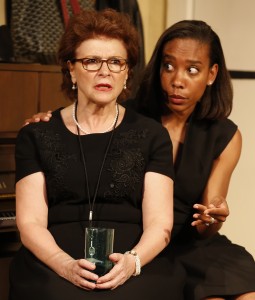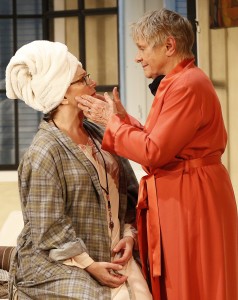Novenas for a Lost Hospital is a memory play told through several narrators that celebrates St. Vincent’s Hospital, a Catholic charitable hospital in the West Village that was founded in 1849 and closed in 2010. The novenas (devotional prayers in Catholicism), of which there are nine, give structure to the elegant sections that move back and forth in time from the founding to the closing. The effect is part drama, part history lesson, and part activism/immersive theater.
Original Sound
Original Sound, deftly written by Adam Seidel, explores the idea of what it means to be an original music artist in the age of the Internet, which has made it easy to borrow pieces of others’ work (“sample”) and use in your own. At the center of the story are Danny Solis (the sublime yet down-to-earth Sebastian Chacon), a Nuyorican mix artist who is having a hard time getting by in life because all he wants to do is make music, and Ryan Reed (Jane Bruce, a talented singer/songwriter in her own right) who is an upcoming star with a recording contract.
Heist!
Heist! is a funny, upbeat new showcase for highly talented musical theater artists. Directed by James Will McBride, the show concerns three bank robbers —Gil (Cordara Newson), Jack (Alec Irion) and Chris (James Cella)—and a job gone bad. Their robbery fails, and only Gil and Jack escape. Jack spirals downward at the news that Chris was killed by the police.
Loveless Texas
Inspired by Shakespeare’s Love’s Labor’s Lost, Boomerang Theatre Company’s Loveless Texas is a toe-tapping musical comedy set during the early years of the Great Depression. Although many of the characters hold the same names as in the Shakespeare play, the story begins with a twist: Berowne Loveless Navarre (the hugely talented Joe Joseph) and his buddies—Duke Dumaine (Colin Barkell) and Bubba Longaville (Brett Benowitz)—are playboys who travel from New York to Paris. Along the way they do all the things that upstanding young men shouldn’t be doing: chase women, drink liquor and spend the Navarre family money.
Street Children
Pia Scala-Zankel’s 2014 play Street Children captures a small slice of life for gay and transgender kids on the streets, and features an ensemble of transgender, queer and gender-fluid actors. Set in the late 1980s around the West Side piers on the outskirts of the West Village, sex is currency in their milieu. When Jamie, played skillfully by Eve Lindley, arrives for the first time at the piers, her nose has been bloodied by a trick gone bad. She’s 17 and unschooled in this world yet she has nowhere else to go. Like all the kids who arrive here, she has been rejected by her family and society at large.
’Tis Better to Have Loved ...
Out of the Mouths of Babes, a fun new situational comedy by Israel Horovitz, explores both the light and dark sides of life. In it, four women, three older and one younger, gather on the eve of a funeral. The deceased was a man they were all either married to or lovers with. In the opening scene, Evelyn (the remarkable Estelle Parsons) and Evvie (the earthy yet fiery Judith Ivey) meet in his apartment. It is familiar to them both because they lived there at apparently separate times. However, it turns out there was some overlap, and you know what that means.
Added to the mix is the morose Janice (Angelina Fiordellisi, an actress with the commanding and stentorian voice of an old-school stage actress, and founding director of the Cherry Lane Theatre), who was not invited at first because she was thought to be dead—she has a history of suicidal tendencies. Her first attempt was out a window in the very same room where they are all meeting. She left him for the same reasons the others did: infidelity. Marie-Belle (effervescently played by Francesca Choy-Kee), the thirtysomething kooky and idealistic most recent girlfriend of the departed (who was 100 when he passed away), has invited them all here. She appears to have psychic access to the deceased man and channels his thoughts as well as appears to remain, literally, in touch with him when she breaks into fits of laughter from the tickling matches he engages in with her from beyond the grave.
Death, rarely welcome, but always inevitable, can provide a microscope for the living to look at their lives in the present. Although at first they are cynical and even antagonistic toward one another, the women develop a rapport and join together in their concern for Janice. Whenever they lose sight of her, they immediately bond and frantically ask: “Where’s Janice?” And, unfortunately, at one moment when the other women are caught up in a reminiscent reverie about the past and the man who is now gone, their worry proves valid. There is nothing funny about suicide, but a topic can be made funny by the right ratio of drama to comedy. Under Barnet Kellman’s direction, the balance is perfect.
Neil Patel’s scenic design not only captures the airy and orderly nature of a Parisian apartment but is further complemented by the warm and intimate space of the Cherry Lane Theatre where the play is running. Paintings adorn the walls in Parisian salon style (and turn out to be the works of famous actors such as Rosie O’Donnell, Billy Dee Williams, and Joel Grey, among others). The one painting, however, that is given the most attention is Untitled Peonies, a work that Evelyn recognizes as her own creation from when she lived in the apartment in the ’60s. She can’t believe he still has it hanging on the wall.
Each of the women—Evelyn, Evvie, and Janice—left the man for the same reason. His unfaithfulness drove them away, but the initial bitterness and anger over his infidelity covers up the sadness and lament for the loss of a great love. When Evvie says, “He was a collector,” she means it as a bad thing. However, Horowitz suggests that collecting things, like lovers or paintings of former lovers, is a way of celebrating life.
Marie-Belle turns out to have an odd agenda. She extends the idea that they should all live together after the funeral. She claims she is rich, and although she appears to be an interminable airhead, has made a lot of money playing the stock market on advice from a friend. Between the apartment and the money, she feels they could have a good life together. Perhaps she is onto some kind of new age, enlightened concept of co-housing. Janice jumps at the chance, rather than out the window again. Evelyn, who is 88, and Evie, who is 68, warm to the idea. It’s attractive, not only because of their age, but because, truth be told, they are lonely, and living together may be a good antidote. They certainly know the apartment, and for all the bad memories, there are lots of good ones as well. It was their home once before. Why not again?
Israel Horovitz’s Out of the Mouths of Babes is playing at the Cherry Lane Theatre, 38 Commerce St. (near Sixth Avenue South). Evening performances are at 7 p.m. Wednesday through Saturday; matinees are at 3 p.m. Wednesday, Saturday, and Sunday. For tickets, call OvationTix at 866-811-4111, go online to www.cherrylanetheatre.org, or purchase them at the Cherry Lane box office.













